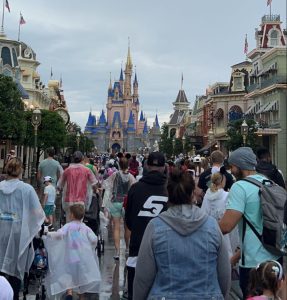COVID’s Mental Health Legacy

December 21, 2020
COVID-19 is much more than just a virus; it is a global crisis that we will be feeling the after-effects of for many years to come. And although young adults are not dying at the intense rate of those 65 and above, COVID has brought out a terrifying Mental Health crisis that if not seriously dealt with, could affect students way beyond 2020.
For me personally, this year has definitely damaged my mental health but, I am not the only one, in fact, in a study from the UK, 69% of young adults aged 13-25 reported their mental health as poor due to the start of school, a rise from the 58% who described their mental health as poor before the start of school. And, in another study from the CDC, “Adolescents aged 12–17 years accounted for the largest proportion of children’s mental health-related ED visits during 2019 and 2020”. With suicide being the third largest cause of death among young adults, we can assume that a worldwide pandemic has only made it worse, and it is not hard to understand why.
In an interview with Ms Rarich, Chatfields social and emotional learning specialist, I asked “Within the student population, what do you think is the number one cause of mental health issues? Has this changed within the COVID era?”
Her response: “Disconnection… Yes, I think COVID has highlighted an over-dependence on structured social events and settings, to the neglect of individual relationships and connections. Generations past were much more in-person social, and the challenge this generation has in self-creating connection intensified the sense of aloneness for some”. With the lack of accessibility to school, jobs, and overall stability, the feeling of isolation is much higher within the student population. “Adolescence is a time of individuating, creating identity and distancing from family towards adulthood,” Says Rarich, “The restrictions of COVID health precautions make this much more difficult”.
For students who feel the pandemic’s mental effects, hotlines and other mental health care are very valuable. But, as a new survey from the World Health Organization finds, 72% of mental health services for children and adolescents have been disrupted due to COVID-19. In the same survey from the WHO, even though 89% of countries reported that mental health and psychosocial support are part of their national COVID-19 response plans, only 17% of these countries have full additional funding for covering these activities. These fundamental data pieces are why I think that the mental health crisis brought out by COVID is very dangerous; mental health issues are rising, but so are uncertainty and lack of reliability to the very services meant to help us.
I have mentioned it briefly, but my own mental health is currently in shambles; and with doing all of this research, I have come to the understanding that I am not alone in these issues that I am facing. So, if you are reading this, and you too are increasingly lonely, anxious, and overwhelmed, I want you to know that you aren’t alone. As Ms Rarich says, “We know this is such a difficult time, and we also know that young adults are resilient! Lean into this time to develop relationships that you want supporting you, reach out to those who care about you—family, friends, your educators, coaches, faith leaders. Seek help from those you trust, and know that we can do hard things. This will not last forever.”
Everyone is deeply feeling the effects of COVID, and whether or not you have been hit by it directly or indirectly, we can all agree that this is a time we will never forget. If you are experiencing mental health issues, I deeply encourage you to reach out and take the opportunities presented to you. Chatfield has a multitude of resources available for you, Ms Rarich “would like to invite students to sign up for our Monday conversations, Mental Health Activities, and Sources of Strength events, by texting @20Wellness to 81010, and also review mindful tips and other info on my website by going to tinyurl.com/CSHRarich or tinyurl.com/CSHMindful. In the spring, we will resume Monday Charger conversations (open to all—topics determined by those who attend), Gifts of Perfectionism (overachiever group) on Thursdays (text @CSHGifts to 81010 to join), and you can always schedule to speak directly to Ms Rarich at Calendly.com/Rarich or your counsellor. Find links on the Charger webpage or your class google classroom”. If for any reason you do not wish to get help via the school, reach out and express how you are feeling, I know it will payout in the long-run.
To me, the legacy of COVID will always be struggles we faced in 2020, but as we are headed into the new year, we must be sure that we are dealing with those issues. The data doesn’t lie, and I believe that as a society, we need to acknowledge that COVID encapsulates much more than just an illness. I would even go as far as to say that the real pandemic is the mental health issues that the COVID era has caused. As a wonderful student-published report detailed, “The COVID-19 pandemic has presented us with myriad challenges, and the way we respond is going to shape the mental health of adolescents for the future”.






